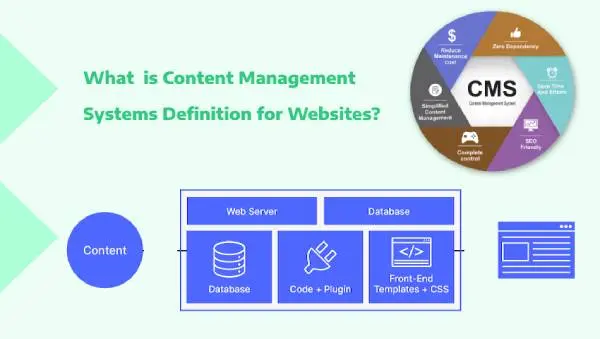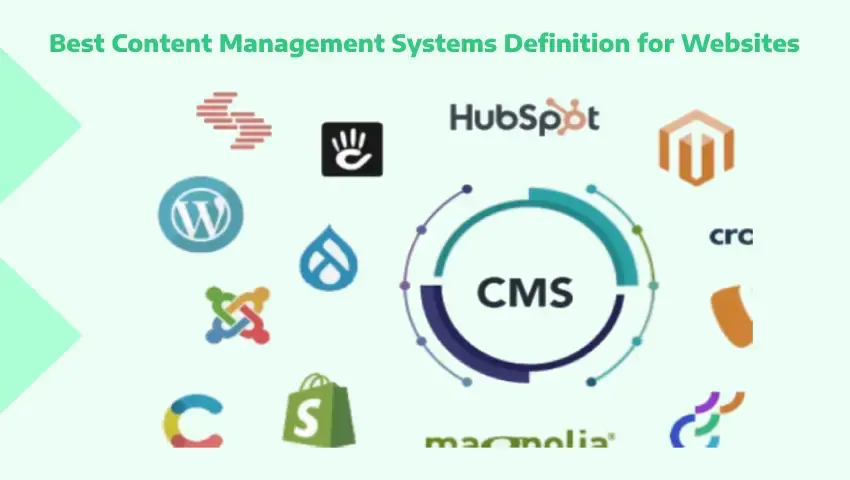This essay will establish a detailed comprehension of Best Content Management Systems Definition by examining its role in website administration. See More From Google Ads Content Management Systems. See more blog.
Table of content
A strong dynamic presence online represents a crucial necessity for every person plus business and organization in the current high-speed digital environment. One can leverage Content Management Systems – CMS options to create this outcome. This extensive paper divides a 1000-word investigation of CMS into segments which analyze its definition and significance as well as functionality and renowned software choices. Content Management Systems
Content Management Systems as Definition Gives Your Online Platform the Power it Needs
Business owners with business concepts or bloggers who need to share stories alongside non-profit groups who need to support their missions make up this example. You possess a digital platform which functions as a website to present your concepts and portfolio or business offerings to the worldwide audience. Your website functions as an online establishment entrance during this digital era so you need an interface which offers convenience and delivers important information while remaining easy to maintain. The Content Management Systems Definition serves as CMS to satisfy all these management needs. Content Management Systems
Defining Content Management Systems (CMS)
A Content Management Systems Definition works as both a database management system and a platform which allows users without technical knowledge to create organize and publish digital content on web pages. This user-friendly toolkit provides tools for establishing online presence maintenance to all kinds of users including organizations and businesses.
The website operates through its central control center known as CMS. An automotive dashboard serves as an example for understanding how CMS works because you gain full account access to necessary website controls regardless of your technical knowledge level. Through its functions you can maintain different content elements including texts along with images and videos and documents at ease.
A CMS serves as the principal tool to spread web possibilities among diverse users. CMS offers an intuitive interface for users who do not require programming skills since it was built to deliver a user-friendly platform. Everybody with different educational backgrounds can use the system to independently manage their websites directly. Content Management Systems

CMS in Action: A Practical Comparison: Popular CMS Platforms
To understand CMS practical functioning we can analyze three CMS solutions: WordPress, Joomla and Drupal using an illustrative example.
1. WordPress
As the most successful CMS solution in the market WordPress maintains its position as the king alongside no competition. This system provides an easy-to-use platform which allows maximum customization while controlling a major portion of internet content. WordPress adapts to satisfy the needs of users who run blogging websites or operate small businesses as well as large corporations. Users can achieve extensive site customization through WordPress because it provides a massive selection of plugins and themes.
2. Joomla
The CMS Joomla delivers both flexibility together with scalability features. The platform fits well for complex content websites. Joomla brings together an extensive community base and diverse extension library that provides all the resources required for developing complex web projects.
3. Drupal
Businesses and development teams select Drupal when they require powerful content management solutions. This system demonstrates superior functionality when dealing with websites that contain extensive information. Through its adaptable design Drupal enables organizations to manipulate content with precision therefore it suits those businesses with specialized needs.
4. Magento
For e-commerce purposes Magento serves as the optimal content management system. Online stores can use this platform which gives them specialized tools to run their business and process products as well as inventory and sales operations. Customers seeking customizable platform solutions with growth scalability should choose Magento because it caters to robust business expansion requirements.
5. Shopify
The online marketplace contains Shopify as one of the major e-commerce platforms. The platform provides a simple interface which helps new entrepreneurs start their online retail operations instantly. Clients who want to establish product sales online will find Shopify an excellent choice because it offers various templates along with a simple interface.
6. Wix
Wix delivers CMS capabilities through its user-friendly system which allows website construction by simple drag-and-drop functions. The platform suits users who need their website to have an attractive design but do not require technical complexity. Users of Wix can access numerous templates and functionalities suitable for personal site and small business website creation.
7. Squarespace
Squarespace offers its users a collection of contemporary templates that represent beauty and elegance. Creative professionals together with artists and photographers will find Squarespace an outstanding platform to display their work using elegant visual designs. Squarespace also offers e-commerce capabilities.
8. Ghost
Ghost presents itself as a content management system that has been specifically designed to serve both bloggers and creators of content. There exists a writing environment with minimum distractions while offering users a selection of beautiful minimalist template designs. Users seeking high-quality content with easy readibility should consider this platform as their excellent option.
9. Blogger
Users can access Blogger for free through Google ownership as a CMS platform. Users can easily operate this platform to create personal blogs. Starting bloggers can find basic features that make Blogger suitable for their entry into the field.
10. Typo3
The enterprise-class open-source CMS Typo3 delivers stability together with extensibility throughout its framework. Large organizations and government websites select this platform because of its top position. Typo3 lets users create comprehensive modifications to their system while providing support for multiple languages.
11. Kentico
Kentico functions as an adaptive CMS product built to meet the requirements of business operations. This platform unites content management tools with e-commerce systems as well as online promotional methods. For organizations that want to handle their web content management processes effectively Kentico provides a complete solution.
12. Umbraco
As an open-source CMS platform Umbraco operates under an active developer community. The system provides adjustable features combined with unlimited growth potential and multiple capabilities. The Umbraco content management system serves both small and large website needs because it can adjust to individual requirements.
13. ExpressionEngine
ExpressionEngine enables users to manage content through adaptable control software. Web developers along with designers choose this platform since it efficiently accommodates different project-specific needs.
14. Textpattern
Textpattern provides a minimalistic CMS solution which emphasizes straightforward operation for everyone. Small website owners benefit from Textpattern as a user-friendly platform which serves their content publication needs well.
15. Contentful
Contentful works as a unique Headless CMS system because it divides content presentation from content creation allowing omnichannel content delivery. The system serves businesses which need to distribute their content across multiple platforms as well as devices.
The Anatomy of a CMS: Content Management Systems Definition
Our examination of CMS fundamentals together with crucial functional aspects is now possible after establishing the understanding of Content Management Systems Definition. Content Management Systems
A CMS depends on its User Interface which functions as the central component between administrators and the system. The system communicates with administrators and creators of content through this area during their interaction process. The user interface features an attractive interface that helps users build and modify Content elements such as pictures and textual information and multimedia content.
The content editor functions as a text creation tool which provides formatting features to users for adding multimedia assets to produce interactive pages along with posts. The content editor functions like a standard word processor therefore users find it comfortable to use.
A Content Management System includes media libraries which allow users to maintain control of their documents and images and videos and multiple other digital materials. The media library provides a streamlined method for users to integrate different forms of content into web content and blog articles. Content Management Systems
CMS platforms provide users with multiple template choices together with theme options that configure website visual presentation. A CMS platform includes template collections from which users select according to personal branding requirements or they design their own unique templates.
CMS enables user extension through its functionality that incorporates Plugins Extensions and Modules. Users enhance website functionality by installing plugins in WordPress and extensions in Joomla while Drupal uses modules. The system includes fundamental elements which supply supplementary features for users.
CMS platforms automate user management through built-in features that enable site users to establish access levels for contributors as well as team members and team members. Different platform users can access only those CMS components that directly support their work responsibilities.
The tools for search engine optimization are integrated directly in different CMS options. Various Optimization (SEO) plug-ins and instruments within CMS platforms can boost website visibility within search results. Such functionality attracts natural website visitors prominently. Website’s visibility on search engine results.
Digital security stands as an absolute top priority in the digital world. CMS platforms undertake regular updates of their security frameworks whose purpose is to defend websites against malware-hosting intruders and hacking attacks.
Why CMS Matters: Content Management Systems Definition
Technical competence and programming abilities were needed in large amounts during the initial era of internet development for website construction and upkeep. Webmasters otherwise spent a great deal of time using multiple intricate HTML codes for updating and adding new website elements. Web development was accessible only to a specific group who had mastered the required skills.
The digital world experienced a complete transformation after CMS appeared on the scene. This system enabled more people than ever before to start building and managing their websites. The digital world now enables anyone who lacks coding knowledge to operate online successfully.
A small bakery owner like yourself wants to display their attractive pastries and cakes through online platforms. A Content Management Systems Definition enables you to build an attractive website then display high-resolution food images and write appealing product descriptions together with implementing online ordering functionality all without penning any code or scripts. The systems manage and provide all information (Content Management Systems Definition).
Conclusion
The Content Management System (CMS) delivers powerful capabilities which let users fashion and handle digital content through untechnical interfaces. By providing user-friendly interfaces, customizable templates, and robust functionality, CMS platforms streamline website development and content organization. The CMS solutions WordPress, Framer, Webflow alongside others enable users through their advanced features to handle online content creation effectively across personal blogs or corporate sites and e-commerce platforms.

